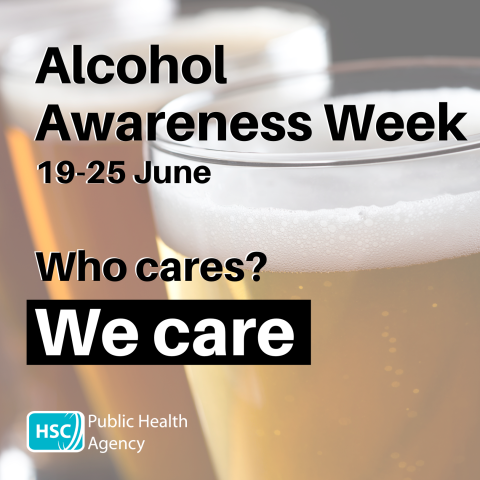Alcohol Awareness Week – help is here for you

This Alcohol Awareness Week (19-25 June) the Public Health Agency (PHA) is highlighting the support services that are available for individuals who misuse alcohol.
Northern Ireland Alcohol Awareness Week is a collaboration between the PHA and Northern Ireland’s five Drug and Alcohol Coordination Teams (DACTs) and this week’s theme is ‘Who cares? We care’.
With more than 170 alcohol and drugs support services listed on www.DrugsAndAlcoholNI.info available in communities across Northern Ireland, people who misuse alcohol are being encouraged to reach out and seek help.
Kevin Bailey, the PHA’s Regional Lead for Drugs and Alcohol, said: “It is easy to forget that alcohol is a powerful drug and we need to be careful how we use it, and be aware of the effect it can have on our health and the negative impact on those around us.
“Taking that first step to seek help with alcohol and drug issues is difficult but it is made all the easier by services being local to you and readily available.
“Across Northern Ireland there are support services, not just for those misusing alcohol and drugs, but also for their families. If you are affected by someone’s alcohol misuse, reach out and seek help. A range of the services available can be found on www.DrugsAndAlcoholNI.info with a breakdown of services in each Health and Social Care Trust area.”
Around four-fifths (79%) of adults aged 18 and over in Northern Ireland drink alcohol and more than half (55%) of drinkers have reported drinking at least once a week.
Kevin continued: “Many people might use alcohol to relax but instead of helping us to cope, excess amounts can have both an immediate and long-term negative impact on our lives.
“In the short term, the undesirable effects of drinking too much can include symptoms such as vomiting and hangovers. However, more serious risks from drinking heavily can include damage to vital organs and falls or accidents that can result in injury.
“Drinking too much can also affect our judgement, leading us to do things we wouldn’t otherwise do and that we might regret later. These can include unplanned sexual activity, relationship difficulties and getting into violent situations.
“It is therefore important that people start to understand their drinking behaviour and explore their relationship with alcohol and take steps to reduce their risk of drinking too much.
“Small changes can make a big difference.”
Seven tips for Northern Ireland Alcohol Awareness Week:
- If you think that you, or someone you know, has a problem with alcohol misuse, find support services in your local area at www.DrugsAndAlcoholNI.info
- use the alcohol audit tool to assess your own drinking habits; www.DrugsAndAlcoholNI.info/alcohol-units
- have several alcohol-free days each week;
- when drinking at home try to use a measure if you can and don’t over-pour – if you have any kitchen measuring tools, these might help you;
- always look after yourself and know what your limits are;
- learn how many units are in your chosen drink;
- never add other drugs into the mix.
Visit the PHA and DACTS social media pages more tips and advice during Alcohol Awareness week:
- www.facebook.com/publichealthagency
- www.twitter.com/publichealthni - @publichealthni
- www.instagram.com/publichealthni - @publichealthni
- www.facebook.com/NIDACTS
- www.twitter.com/NIDACTS
Notes to editors
The Health Survey for Northern Ireland 2021/2022 can be found at:
www.health-ni.gov.uk/publications/health-survey-northern-ireland-first-results-202122
It shows that:
- In 2021/22, four-fifths (79%) of adults aged 18 and over reported that they drank alcohol. This was lower than in 2020/21 (81%), but similar to 2019/20 (77%).
- More than half (55%) of drinkers reported drinking at least once a week. This was similar to 2020/21 (58%), but higher than 2019/20 (50%)
- Over half of drinkers (55%) reported that over the last twelve months they had been drinking the same as before, while almost a third (30%) reported drinking less and 15% reported drinking more.
- In 2021/22, over four-fifths of males (83%) and three-quarters of females (75%) were drinkers. The proportion of males that drink was the same as in 2020/21 (and similar in 2019/20 – 80%); while the proportion of females who drink alcohol decreased (from 80% in 2020/21) to a similar level as in 2019/20 (73%), suggesting a return to the pre-pandemic level.
